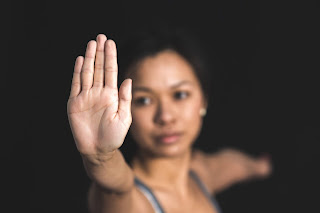What are the 8 levels of relatability and how do they affect our connection to the rest of society?
The 8 levels of relatability and how they affect our
connection to the rest of society
What is Autonomy? In a counselling role this means as a
practitioner encouraging and respecting a client’s decision to govern
themselves, to come to their own conclusions and act on their own values
through their own personal choices based upon their experiences and learnings
in life so far. This can give an interesting insight into human nature and
allow us to understand and respect our differences and learn from them.
We will never be the expert in understanding another person’s
life because we have never walked a day in anyone else’s shoes apart from our
own therefore we can never fully appreciate the life experiences they may have
endured. It may sometimes be the case however that we relate all the things
that have happened to us personally to other people also meaning that confusion
and conflict can arise when we feel they do not see things in the same way that
we do .Principle governing factors which have a huge impact on our connection
with ourselves and the world but also with understanding others and society as
a whole include Culture, Race, Language, Hierarchy, Prejudice, Racism,
Orientation and Stereotypes. The interesting fact about this is that although
we are all different we all share the same concerns but we may just relate to
them and choose to share them in a different way.
Culture: The
ideas, customs and social behaviour from a particular cultural group of people can
sometimes conflict with our own if we are from a different culture, we may feel
that they do not fit what our view is that they should be or it may even be
that we have different views from our own culture and what is considered the
normal way to think, feel, speak and react so we feel we do not fit in which
can then cause other problems particularly with self-esteem and self-acceptance.
How well we relate to ourselves throughout life can be heavily impacted by how
culture has related to us previously and what we have learned. If we have not
been unconditionally loved and accepted by others throughout our lives it can
be very difficult for us to love and accept ourselves. It is therefore very
important that we are able to understand how our history has impacted who we
are today so we are then able to understand and be able to relate to other
people’s views and opinions not only from the same culture but also other ones with
no judgement or misinterpretation.
Race: It is
unfortunate that human nature as a whole can sometimes be intolerant towards
other people who may not be from their own race and therefore it is not always
possible to appreciate differences including the colour of another person’s
skin or religious and culture beliefs or practices. Some people may choose to
reject something they do not understand rather than try to educate themselves
so they are able to do so. This is when issues of superiority and a lack of
awareness in the different races can cause conflict with one feeling they may
be deemed more important than another, it may even be that we take an
experience from one individual of a certain race and then use that same
experience to generalise that everybody else from that particular race are then
the same in their beliefs, simply because of this one experience we have had. This can then be seen as completely unfair by
those who are in an awakened state of mind but sadly generally as an entire
race this is still an ongoing issue occurring throughout the world.
Language: The use
of language can either build someone up or tear somebody down, it is not simply
about just what we say. Words, tone and our personal attitude all combine for
effect and actually the tone in which we say something has the biggest impact
more so then the words we use. How we choose to express ourselves to others
will hugely influence if they are then able to react positively to us and if
they feel they are able to trust us. Although our culture can have some effect
on how we choose to communicate with others ultimately as individuals we do
need to take personal responsibility for our words and actions towards others
and appreciate how they may be interpreted and the impact they may have on
them. Generally the words we use to communicate are the ones that best describe
what we are trying to say but this is not always the case and sometimes someone
may try to express themselves in a certain way which is then misinterpreted
through their use of words, tone or attitude which ultimately then may cause
misunderstandings and tension.
Hierarchies: If
we consider the relationships we have in our life and how we relate to them
this can be an interesting concept. First of all think about someone who you
may feel is superior to you and then someone who you may feel is inferior to
you. This can be a very arrogant attitude to have towards others as it can give
you a false sense of security if you feel in some way you are better then
another person. However rather interestingly it can also work the other way by
comparing ourselves to someone we feel is better than us in some way we are
unconsciously putting ourselves down, therefore both attitudes are very
unhealthy. Some people do have a habit
of incorporating a hierarchy structure into their relationships for example if
our partner believes our needs are more important than their own and puts us on
on a pedestal it can not only be very damaging to their own self-worth but also
highly damaging to the relationship and will be a barrier to stop it developing
and continuing to grow.
Prejudice: This
affects us all in what we consider to be right and wrong. It is important to
understand that no two people in the world will ever think exactly the same way
due to the various levels of relatability which affect us all in the way we
think and feel. Through previous life experiences and the role models we have
had, we have been socially conditioned as to what is and what is not
acceptable. However, the rules that we choose to live our lives by are actually
just an expression of our own prejudices. It is important to understand that just
because we may view things in a certain way does not mean that other people
will automatically share the same opinion we do and for this reason it is
important to respect other people’s views equally to our own and accept our
differences.
Racism: How well
do you relate to people of a different race? How do you feel about other people’s religious reliefs and
practices? Do you respect them equally to your own or do you feel yours is
better? If we really look deep within us what is the real truth? Racism is a
prejudice against a person or people of a different race or ethnic group but
where does this come from, children do not see colour so when is this innocence
tainted and by whom? Our lives are hugely influenced not only by our own
culture and history but also by prominent figures such as our parents, teachers,
friends and colleagues who can have a huge impact on how we feel about others
from different ethnic backgrounds. If we have been the victim of racial abuse
we are very aware of how raw and painful that can feel but are we then just as
aware when we are discriminating against others even if we feel we are not? We
all have our own views about what is right and what is wrong but it is
important to remember that just because we see things a certain way does not
mean that everyone else will share our same opinion. Education and compassion
for others is the key to not only accepting our differences but being able to
celebrate them.
Orientation: Sexuality
is how we choose to identify in our personal relationships and there are many
different terms depending on our individual sexual preferences. Although you
may feel you have an open approach to orientation in our new modern world if
you have been raised in a highly religious family or a culture where anything
outside what is considered a straight relationship is not accepted then there
may be some kind of underlying prejudice present in some form which has been
learned through your upbringing. It can
be particularity difficult for people who may be confused about their sexuality
or orientation if they are in a situation such as this constantly living with a
fear that they will not be accepted by their culture or family if they express
how they really feel can lead them to live a life where they are not being
their true self for fear of judgement or repercussions from others who they
feel will not approve or understand. Therefore they will continue to act and
behave in a certain way for fear of rejection. Tragically this will continue to
haunt them until they have the strength to reveal how they really feel to not
only their own culture but the people who matter the most to them.
Stereotypes: We
are all different not only in our
views and opinions and how we relate to the world and others but also in our
upbringings. How many of us are guilty for putting labels on others or making
judgements even when we do not even know that person. It may be a picture we see or something we
hear about them or something they have written but how is it fair or reasonable
to stereotype someone based on our own belief system? Prejudice can come in
many different forms and can at times surprise us especially when we are proved
wrong. It is therefore an important lesson to learn not to judge others on
superficial things such as how they look, dress or do for a job but rather see
them as they truly are before forming an opinion. People will be affected by
the way they have been brought up and the values they have been taught but to really
find out about who someone instead of automatically stereotyping them with our
own prejudices and judgements we need to look deeper and beyond so we can form
fair and just opinions and where is the best place to do this? It’s actually
very simple, take everything else away and just look into what you see and feel
in their heart and eyes and that will tell you everything you need to know.



Comments
Post a Comment